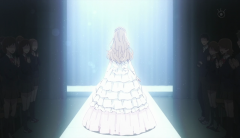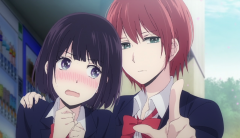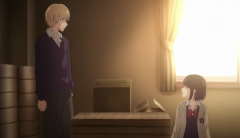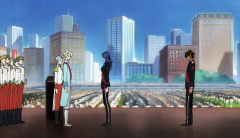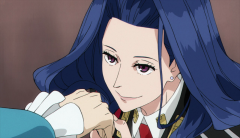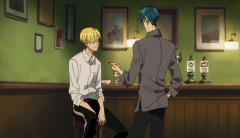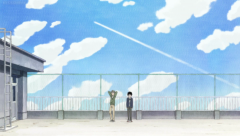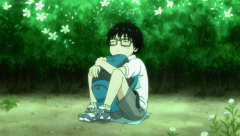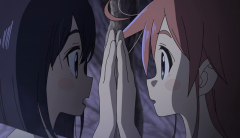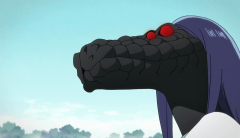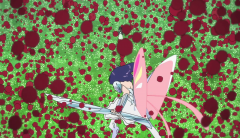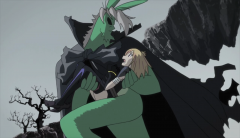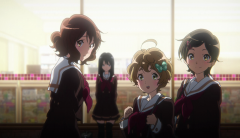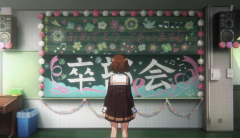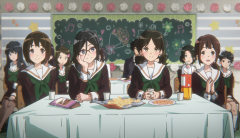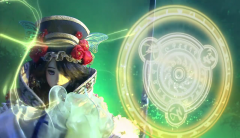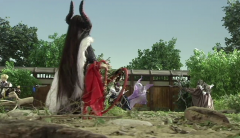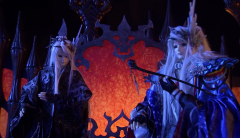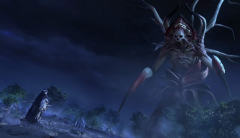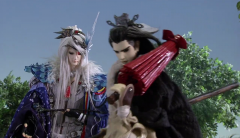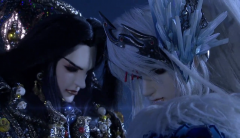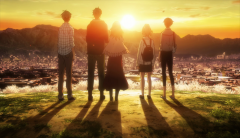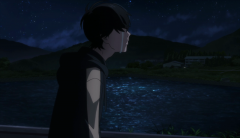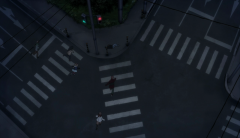So we end things up with the bookend of school festivals, huh? I think I get it, school festivals supposed to be fun, exciting and thrilling which is exactly opposite with how Hanabi feels. She feels lonely, but now as time slowly passes, when all the pains become somewhat endurable, she just wants to be left alone. Drifting in life so to speak. But that happy tones of those school festivals seem out of place to me, especially those comic exaggerated reactions don’t land well. Maybe in the manga form it works better because we can still have the silent moments of sobering, but in anime there are noise everywhere. The jump back and forth between festivals don’t really inform us much either. That got me thinking but I do feel that in this case, the best way to end the show could be flashforward few years into the future and show us how the characters are at that time. In Flowers of Evil, when the manga did the massive time-jump, it felt jarring at times, but afterward I found that last part the right treatment to examine the wound, the aftereffect of those obsessions bring to the main character. In Scum’s Wish, the characters are in the same circumstances: lost and adrift in life, time can indeed heal these pains but those wounds don’t heal overnight. It’s a progression; seeing how the past still affects them, but they still can move on with their lives would be rewarding enough. But I’m settled with this ending, not the best way to close up the story but it still pulls great emotional punch to our two mains.
It’s great to bump up each of the cast for the last time, and they’re all in a better, healthier stage right now. Moca embraces her dark self and becomes more beautiful, more attention-grabbing because of it. Remember the ugly duck transforms into a beautiful swan fairytale? Well, she was no ugly duck by any mean but this is a right metaphor for Moca: SHE TRANSFORMS. Ecchan; cuts loose her hair and still manages to be that hot, lets go of that dark past behind and moves on. The way she treats Hanabi was the same way Hanabi treated her back then, sincere and earnest as friends. Four-eyed teacher and Akane are all happy, of course, with the wedding around the corner. Hanabi had a moment to really accept that she can’t never be with Harumi and feel happy for him, and I love the brief moment of Akane being her usual self while picking on Hanabi. As it turns out, I’m pretty the same with Mugi, preferring Akane when she was a broken, lonely character than her current happy version.
At last, it’s time for Mugi and Hanabi relationship and overall I like this treatment. Back in my weekly coverage, I firmly believed that they couldn’t be great together because they don’t talk to each other about their problems, instead just keep those feeling bottled inside and release them in terms of sexual contact instead. Well, this last time they do just that, talk to each other about everything, no physical contact, and decide to part ways to grow on their owns and find their new true love. Well, this show’s main theme has always been about exploring unrequited romances, so I’m happy with this ending; although I do feel like they could’ve been better. As a final impression, Scum’s Wish is an emotionally charged and mature series that don’t afraid to go dark and disturbing to examine unflinchingly on what it means to love someone with all your hearts. I don’t mention it much in my weekly reviews but the direction for this show is rock solid, and I pretty much agree with most of their visual choices there. As for my personal feeling on Scum’s Wish, although the show managed to grasp me personally, I’m more respecting it as a well-written character study, rather than outright responding to it. I’m not that big romance and true love to begin with. Can’t say I’m “enjoying” the experience but I’m glad that I’m sticking with it, because it manages to pull many raw feelings that other series shy away from addressing. The pains won’t go away anytime soon for our Hanabi and Mugi, and I know at the end of this trip, they don’t learn much about what they want, but certain only of what they didn’t want. And that’s fine, it’s all part of growing up.


